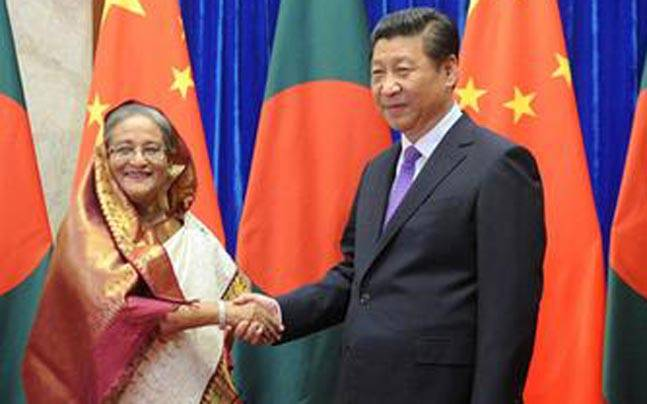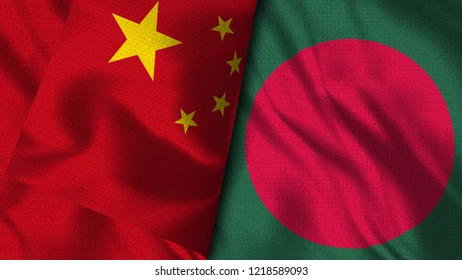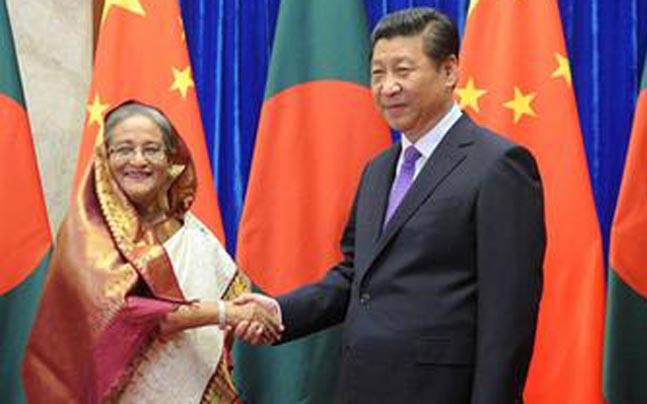
(Image source : India today)
China’s President Xi Jinping has guaranteed his support for Bangladesh . This comes in wake of Bangladesh staunch opposition to external interference . They would also like to deepen their cooperation through their Belt and Road initiative
China has been a major supporter of Bangladesh for many years. It has provided billions of dollars in aid and investment, and has helped Bangladesh to develop its infrastructure, economy, and military. China’s support has been crucial to Bangladesh’s transformation from a poor, agrarian country to a lower-middle-income country.
Sheikh Hasina’s stance on foreign interference
Bangladesh Prime Minister Sheikh Hasina has repeatedly accused foreign countries of interfering in the country’s internal affairs. She has specifically named the United States, the United Kingdom being involved in this interference.
Hasina has said that these countries are trying to destabilise Bangladesh and prevent it from achieving its development goals. She has also accused them of supporting the opposition Bangladesh Nationalist Party (BNP).
The issue of foreign interference is also complicated by the fact that Bangladesh is a strategically important country. It is located in a region that is home to a number of major powers, such as China, India, and the United States. These countries all have their own interests in Bangladesh, and they are all trying to influence the country’s development.
The issue of foreign interference is likely to remain a source of tension in Bangladesh for many years to come. The Bangladeshi government is unlikely to give up its suspicions of foreign involvement, and the major powers are unlikely to stop trying to influence the country’s development.
USA – Bangladesh decline in relationship
When U.S. Secretary of State Antony Blinken imposed a visa suspension against people it believes are involved for “undermining the democratic election process in Bangladesh,” the relationship reached a low point.
Senior members of the Rapid Action Battalion, a tactic used by Prime Minister Hasina in her campaign against terrorism, have also been sanctioned by the United States. Ms. Hasina criticised the United States in April of this year, claiming that “it has the power to topple governments in any country and the Muslim countries in particular are experiencing a tough time.”
Ms. Hasina has promoted a foreign policy of “friendship with all and malice for none” that she has frequently emphasised to provide room for involving stakeholders in Bangladesh and for balancing connections with international and regional allies.
China and Bangladesh relationship
China has been a major supporter of Bangladesh for many years. One of the most visible signs of China’s support for Bangladesh is the Belt and Road Initiative (BRI). The BRI is a massive infrastructure project that aims to connect China with Asia, Europe, and Africa through a network of roads, railways, ports, and other infrastructure. Bangladesh is a key part of the BRI, and China has pledged billions of dollars to help Bangladesh build new roads, railways, and ports.
China has also invested heavily in Bangladesh’s economy. Chinese companies have invested in a wide range of sectors, including manufacturing, telecommunications, and energy. These investments have helped to create jobs and boost economic growth in Bangladesh.
In addition to economic assistance, China has also provided military assistance to Bangladesh. China has sold Bangladesh weapons and military equipment, and has helped Bangladesh to develop its military capabilities. This assistance has helped Bangladesh to improve its ability to defend itself against external threats.
Their relationship is subjected to criticism . But despite these criticisms, China’s support for Bangladesh is likely to continue. China sees Bangladesh as a strategically important country, and it is keen to maintain its influence in the region.
Though Bangladesh has expressed support for the Belt and Road Initiative ahead of its expected joining of the China-led Regional Comprehensive Economic Partnership (RCEP) trade deal, Dhaka hasn’t seen significant financial support from Beijing on the Rohingya issue for which the U.S. has provided at least $1.6 billion since 2017 to deal with the refugee crisis: (Source : Hindu ). The Chinese president also supports the addition of more members in BRICS. All these developments would be closely followed. But Xi Jinping has assured his country of backing Bangladesh regarding their Rohingya issue and their entry into BRICS.

( Image source: https://www.shutterstock.com )













